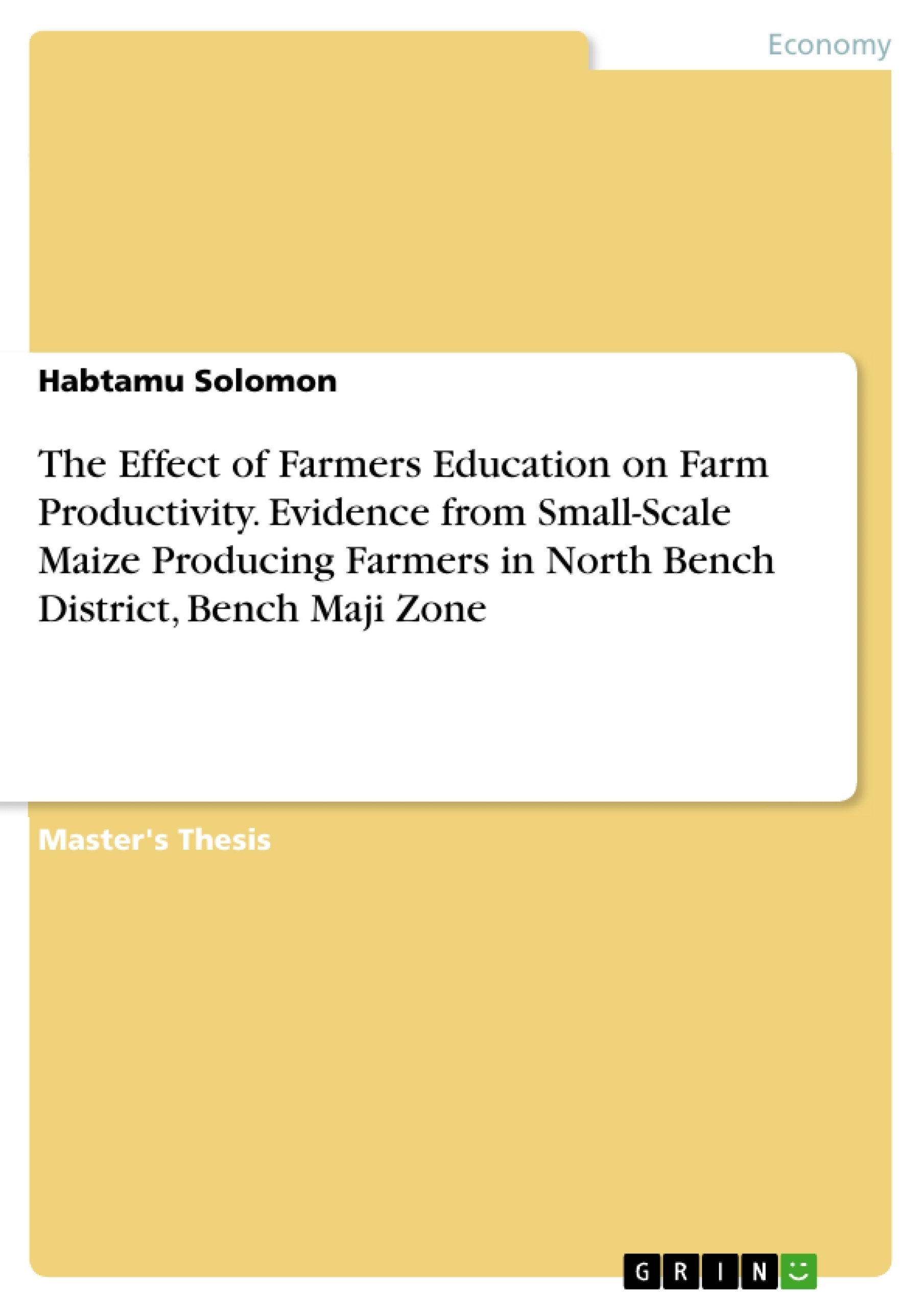The objective of this study is to examine the effect of farmer education on farm productivity of small-scale maize producing farmers. The educational system in Ethiopia is differentiating by low participation rates, particularly in rural areas. The agriculture productivity and income of rural famer is increased by farmer education (both formal and informal education).
In order to achieve the objective of the study cross-sectional data has been collected from 200 maize producing farmers on the production level, farm size, farm input and equipment used, educational level, farm experience, gender, age, secondary occupation, etc. Semi-Structured questionnaire has been administered, and interview was conducted for selected farmers in order to collect the relevant data. Both descriptive statistics and econometrics model were used to analysis the data collected from household head. Cobb-Douglas production function model has been used to analysis the effect of farm education on farm productivity by including the education level as input of production.
Table of Contents
- ACKNOWLEDGEMENT
- CHAPTER ONE
- INTRODUCTION
- Background of the study
- Statement of problem
- Objective of the study
- Significance of the study.
- Scope and limitation of the study.
- Organization of the paper
- Chapter Two
- Related reviewed literature.
- Introduction
- Theoretical Framework
- Education and Economic growth
- Effect of Education on farmers productivity.
- The effect of agricultural extension on farm productivity
- Determinant of farm productivity
- Empirical studies.
- Evidence from developing countries.
- Ethiopian Evidence
- Conceptual framework.
- Estimation of farmer education on farm productivity: Review of competing methodologies
- Non frontier production function Approach
- Frontier Production Function Approach
- Chapter Three
- Methodology of the study.
- Description of the study area
- Research Design
- Types, Sources and Methods of Data Collection
- Target Population
- Sample Size and Sampling Techniques
- Method of Data Analysis
- Descriptive Method
- Empirical model
- Definitions of variables and hypothesis setting
- Statistical and specification test.
- Chapter Four: Results and discussion
- Introduction
- Descriptive results and demographic characteristics of farmers
- Sex of respondents
- Age structure of the respondents
- Farm experience in maize production of respondents
- Formal school attending
- Educational Achievement.
- Land owner ship of respondent
- Extension service contact
- Utilization of Improved seed and chemical fertilizer
- Production function regression
- Basic production function regression
- Effect of farmer education on farm productivity
- Effect of education through input choice.
- Percentage gain per year of education
Objectives and Key Themes
The study aims to investigate the effect of farmers’ education on farm productivity, specifically focusing on small-scale maize producers in the North Bench District of the Bench Maji Zone in Ethiopia. The study seeks to determine the relationship between farmers’ education levels and their productivity, considering factors such as access to extension services and the utilization of modern inputs.
- Impact of education on farm productivity in maize production.
- Relationship between farmer education and the adoption of improved agricultural practices.
- Influence of extension services and input use on productivity.
- Contribution of farmers’ education to overall economic growth and development.
- Policy recommendations for promoting farmer education and improving agricultural productivity.
Chapter Summaries
Chapter One introduces the study's background, problem statement, objectives, significance, scope, and limitations. It highlights the importance of understanding the link between farmer education and agricultural productivity in developing countries. Chapter Two reviews existing literature on the theoretical framework, empirical evidence from developing countries and Ethiopia, and competing methodologies for estimating the impact of education on productivity. Chapter Three details the research methodology, including the study area, research design, data collection methods, target population, sample size and sampling techniques, data analysis methods, and variable definitions. Chapter Four presents descriptive results and analyzes the relationship between farmer education and productivity using regression analysis, examining the effect of education on input choice and quantifying the percentage gain in output per year of education.
Keywords
The study focuses on key concepts such as farmer education, farm productivity, maize production, agricultural extension services, input utilization, developing countries, Ethiopia, regression analysis, and policy implications. It aims to contribute to a deeper understanding of the role of education in agricultural development.
- Citation du texte
- Habtamu Solomon (Auteur), 2019, The Effect of Farmers Education on Farm Productivity. Evidence from Small-Scale Maize Producing Farmers in North Bench District, Bench Maji Zone, Munich, GRIN Verlag, https://www.grin.com/document/1081232



